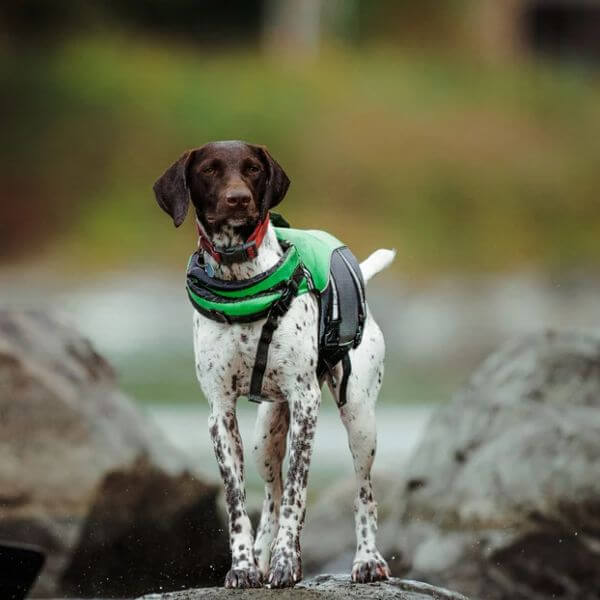PetMeetly helps you adopt a German Shorthaired Pointer: Find Your Perfect Companion Today!
Petmeetly is an exceptional website that connects animal lovers and pet owners, providing a reliable service for those seeking to adopt or rehome German Shorthaired Pointer. Our primary objective is to establish a community where individuals can find their perfect furry companion while offering a safe and caring haven for needy animals.
With Petmeetly, locating your new furry friend has never been easier. You can utilize our platform to browse available German Shorthaired Pointers in your locality and connect with their owners. Our extensive search options make it simple to identify the German Shorthaired Pointer that best fits your lifestyle and preferences.
Also, Petmeetly offers a perfect platform for finding your beloved German Shorthaired Pointer a new, loving home if you decide to rehome them. Our platform is made to link you together with prospective adopters who are willing to give a German Shorthaired Pointer a loving and responsible home. You may relax knowing that your pet is in capable care and will have a loving home.
Every pet needs a loving home, and at Petmeetly we are dedicated to animal welfare. Join our community now to begin your hunt for the ideal canine friend or to support a German Shorthaired Pointer in need.
Everything about German Shorthaired Pointer
The German Shepherd is a breed of dog that originated in Germany and is known for its intelligence, loyalty, and protective nature. Here is some detailed information about the German Shepherd breed.

Height
Weight
Lifespan
Coat
LENGTH OF THE COAT
GROOMING AND SHEDDING
German Shorthaired Pointers shed moderately throughout the year, so regular grooming is necessary to keep their coat healthy and reduce shedding. Brushing their coat once or twice a week can help remove loose fur and prevent matting.
Energy
Barking
Intelligence
Adaptability and trainability
Affectionate with family
Good with young children
Good with other dogs and animals
Behavior towards strangers
Meet our German Shorthaired Pointers
Decided to adopt a German Shorthaired Pointer?
To make sure that you are prepared to provide your new furry family member with a happy and healthy life, it is essential to carefully consider these issues before introducing a German Shepherd into your house.
- Research the breed’s history and temperament:
It’s essential to research the breed’s history and temperament to get an idea of their needs, activity level, and potential health issues. German Shorthaired Pointers were originally bred for hunting, so they have a high prey drive and require a lot of exercises and mental stimulation. They are also known for their loyalty and affectionate nature, but can be prone to separation anxiety if left alone for long periods.
- Consider the breeder or rescue organization carefully
Whether adopting from a breeder or rescue organization, it’s crucial to do your research and ensure they are reputable and ethical. Look for organizations that prioritize the health and well-being of their dogs and have a good track record of successful adoptions. Ask for references and check online reviews or social media pages to get an idea of their reputation.
- Prepare your home for a GSP
Before bringing a GSP into your home, it’s important to make sure your living space is suitable for their needs. They require plenty of space to run and play, as well as mental stimulation through toys and games. Additionally, GSPs shed moderately and require regular grooming, so invest in a goo vacuum and grooming tools.
- Socialize and train your GSP early and consistently
Socialization and training are critical for GSPs to prevent behavior issues and ensure they become well-adjusted, obedient companions. Start socializing your GSP early, exposing them to different people, animals, and environments. Consistent training using positive reinforcement techniques can also help prevent destructive behavior and promote obedience.
Be prepared for potential health issuesLike all breeds, GSPs may be prone to certain health issues, such as hip dysplasia and bloat. It’s essential to be aware of these issues and take steps to prevent or manage them, such as providing a healthy diet and regular exercise, as well as scheduling regular check-ups with a veterinarian.
Invest in appropriate gear and accessoriesGSPs require appropriate gear and accessories, such as a high-quality collar and leash, durable toys, and a comfortable bed. Additionally, consider investing in a GPS tracker or microchip to ensure your GSP can be located if they wander off.
We put together a checklist to prepare you for your new German Shorthaired Pointer and to make your adoption process safe and stress-free.
We put together a checklist of essential factors to consider for a smooth and safe transfer of your German Shorthaired Pointer to the new owner.
Find a German Shorthaired Pointer For Adoption Near You
FAQs
What is the average cost of adopting a German Shorthaired Pointer?
Are German Shorthaired Pointer good with children and other pets?
Are German Shorthaired Pointers good with children and other pets?
Yes, German Shorthaired Pointers (GSPs) can be good with children and other pets when properly socialized and trained. GSPs are known for their affectionate and loyal personalities, and can make great family pets. However, they have a high energy level and may accidentally knock over small children, so supervision is recommended. GSPs may also have a strong prey drive and should be carefully introduced to other household pets, particularly smaller animals like cats and rodents. Early socialization and positive reinforcement training can help prevent aggressive behavior towards other animals. As with any breed, it’s important to teach children how to properly interact with and handle dogs to prevent accidents or injury.
How much exercise does a German Shorthaired Pointer need?
German Shorthaired Pointers (GSPs) are a high-energy breed that require a significant amount of exercise to maintain their physical and mental health. They need at least one hour of vigorous exercise daily, such as running, swimming, or playing fetch. Additionally, GSPs benefit from mental stimulation through activities like training, agility, and interactive games. Without adequate exercise and stimulation, GSPs may become bored, anxious, and destructive. It’s important to note that exercise needs can vary based on age, health, and individual temperament, so it’s best to consult with a veterinarian or experienced GSP owner to determine the appropriate level of activity for your dog.
Are German Shorthaired Pointers hypoallergenic?
No, German Shorthaired Pointers (GSPs) are not hypoallergenic. They have a short, dense coat that sheds moderately throughout the year, and heavily during shedding seasons. This shedding can cause allergies to flare up in some people. However, GSPs are considered to be a low-allergy breed because they produce less dander than some other breeds. It’s important to note that even hypoallergenic dogs can still trigger allergies in some individuals. If you have allergies, spending time with a GSP before bringing one into your home can help determine if you have a reaction.
Should I adopt a German Shorthaired Pointer puppy or an adult dog?
Take into account your lifestyle, prior dog ownership, and personal preferences when choosing whether to adopt a German Shorthaired Pointer puppy or an adult dog. Puppies have the chance for a close link and lifelong companionship, but training, socialization, and exercise with them take more effort and patience. Although adult dogs may already be well-trained, socialized, and have developed personalities, they could need more time and patience to adjust. In the end, both puppies and adult dogs may make wonderful pets, so pick the one that matches your lifestyle the best and offers the love and company you want.
